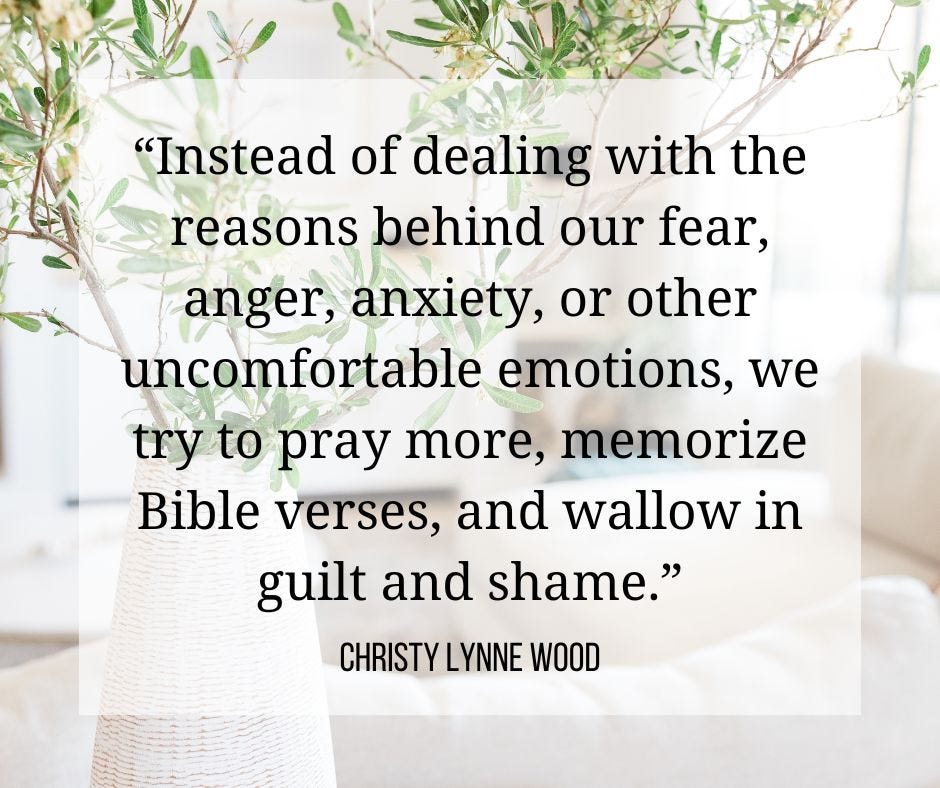Our Weird Evangelical Obsession with Emotions
Thoughts on how American Evangelicalism elevates and manipulates some emotions while condemning other emotions as sin.
All of the Thoughts in My Head
If you’ve been following along the last few weeks, then you know I’ve been discussing emotional and spiritual manipulation on my podcast. I’ve also been reading Karen Swallow Prior’s new book The Evangelical Imagination. This week everything collided with a text conversation I had that inspired me to write a Threads post which generated a great conversation.
And now here we are. I’m not exactly sure where this will go today, but you can expect me to touch on these topics:
Emotional manipulation within evangelical circles is not new.
Somehow many evangelicals have decided that comfortable emotions are good and spiritual, while uncomfortable emotions are bad and sinful.
Because of this, many of us have gotten very good at spiritual bypassing, and we are not emotionally connected or available.
So much of this reminds me yet again of Gnostic Christianity.
Sentimentality and Emotional Manipulation
As I read chapter six—Uncle Tom, Sweet Jesus, and Public Urination—of The Evangelical Imagination, it felt like Karen Swallow Prior had been listening to my most recent podcasts and was responding to me. I’ve been questioning the emotional manipulation happening during events geared towards college students and this definition of sentimentalism resonated.
“Sentimentality itself isn’t necessarily bad. But sentimentalism is an emotional response in excess of what the situation demands; it’s an indulgence in emotion for its own sake. It is emotion that is unearned.
Excessive emotion can develop from within ourselves, arising from our own individual propensities or personalities. But emotionalism can also be evoked by external manipulation.”
Karen Swallow Prior, The Evangelical Imagination
I read this and I immediately thought of the cheesy Christian movies I’ve watched as well as the worship songs with endless repetition of certain phrases that I’ve sang. The creators are almost trying to force a specific emotion out of their audience—an excessive emotion that hasn’t actually been earned by the art.

Evangelical culture loves feeling and causing other people to feel certain emotions that have been deemed good and spiritual. For some of us this has been a positive experience, and for others it has been coercive and traumatic. We encourage joyful enthusiasm, sweet, peaceful contentment, and gentle feelings of happy-sadness complete with happy tears. But there are many other emotions that we quickly condemn as sin.
Emotions You “Should Not” Feel
I regularly heard children in my cult days told to “have a happy heart,” but I’d forgotten about most of it until I was watching Shiny Happy People with my husband last year and came across the spanking scene. Then I remembered more than I wanted to. Children who are spanked until they are “joyful” is an extreme example, but many of us who grew up in American Evangelicalism have come to the conclusion that feeling things like happiness, peace, and contentment is godly while feeling anger, sadness, and anxiety is sin.
I had a quick text interaction with someone this week that set my mind spinning. They asked me how I dealt spiritually and emotionally with my labors after going through multiple miscarriages. Then they told me that they are having to pray constantly about fear and sadness. My heart sank as I read these words and felt the guilt and shame that if often behind them.
Too many of us evangelicals or former evangelicals have bought into the lie that some emotions are good and others are sin. We do not understand that having emotions is part of being human and that our emotions are a neutral part of our humanity with the purpose of telling us something. They might be delightfully enjoyable or downright uncomfortable, but emotions are not sin.
“The concept of sensibility was linked to “emotion,” which means, most literally, a movement out of—in other words, an agitation or responsiveness that begins inside the body and moves outward.”
Karen Swallow Prior, The Evangelical Imagination
Spiritual Bypassing and Christianese Platitudes
Because we have been told and we have believed that uncomfortable emotions are sin, many of us are quick to push past those harder emotions with something called spiritual bypassing.
Spiritual bypassing was a term coined by the late author and psychotherapist John Welwood. He defined the phrase as, “using spiritual ideas and practices to sidestep personal, emotional unfinished business, to shore up a shaky sense of self, or to belittle basic needs, feelings, and developmental tasks.”
Instead of dealing with the reasons behind our fear, anger, anxiety, or other uncomfortable emotions, we try to pray more, memorize Bible verses, wallow in guilt and shame, ask Christians friends to pray for us, and quote Christianese phrases and platitudes. We remind ourselves that “all things work for good,” that “God’s got this,” or that “this is stretching our faith.” But we don’t take the time to look into why we feel these emotions, what is going on inside our hearts, or what we might actually need.
And if we aren’t able to deal with our own uncomfortable emotions, we for sure don’t know how to react to other people’s emotions. So we probably give them much of the same phrases and platitudes instead of sitting in the difficulty with them and saying, “I’m sorry. This sucks.”
Therapists and psychologists will tell you that anger is a secondary emotion; it is an emotion we feel after we feel something else. But when we focus on our belief that anger is a sin, we will try to stuff it down or bypass it. And we will never learn what that anger is trying to tell us. We will never discover the first emotion hiding underneath. Stuffing and bypassing our emotions turns us into people who become emotionally unavailable to ourselves, others, and even to God.
Holistic Humans—Every Part Loved and Understood by God
A few weeks ago, I did a podcast on Gnostic Christianity. The Gnostics were a group of people in the first couple centuries after Jesus’ death who created a religion that appeared to be Christian but held some very different and heretical beliefs. The Gnostics believed that the spirit was good, but that all material things were bad—therefore the body and everything to do with it was bad.
This weird evangelical obsession with our emotions has a gnostic ring to it as though positive emotions are spiritual and therefore good, while negative emotions are part of our body and therefore bad.
The truth is, we were created as holistic people. We are spiritual, physical, logical, and emotional. This is what separates us from the rest of creation and part of how we were made in the image of God. Every bit of us has been corrupted by sin. And every bit of us is able to be healed and restored thanks to Jesus and His life, death, and resurrection.

Often Christians fixate on sin control. But if we think we can eliminate sin by controlling our actions, thoughts, and emotions, then our view of sin is far too small. And our confidence in our own abilities is far too great.
Many believers seem to think that our salvation is by faith, but then act like our sanctification is by works of the law. We cannot remove sin by doing good deeds. And we cannot become holy by controlling our minds, bodies, and emotions. Our only hope is in the power of Jesus and His Holy Spirit to change us from the inside out.
Jesus wants to redeem and restore our whole selves. He loves and understands every part of us. And His grace and forgiveness is limitless. Trusting in Him, and in those truths about Him, allows us to rest and begin to truly heal and be restored by a God who did everything necessary to reconcile us to Himself.
As always, I'd love to hear your thoughts, questions, or comments. You can find me on Threads, Instagram, Facebook, my website, and on my podcast Looking for the Real God. I’d love to connect with you on any of these places!
My podcast, Religious Rebels, can be found on YouTube, Apple Podcasts, Spotify, iHeart Radio, and more. New episodes drop every other Sunday at noon on YouTube and 5pm on Substack and everywhere you listen to podcasts.
You can also order an autographed copy of my book, Religious Rebels: Finding Jesus in the Awkward Middle Way by clicking on the button below.






The sentimentality chapter was the chapter that spoke to me the most because I used to write appealing to people’s emotions. I don’t write with that intention anymore. I write what I need to write but not with the intention to make people feel falsely or trying to correct their bad feelings. Not everything has a happy ending but I feel that a lot of people who write to Christian audiences like to wrap things up in a bow.
Thank you! This was really interesting! I need to read Karen's book...